Similar Posts
The 2014 Pan-Orthodox Liturgical Music Symposium took place July 12-15 at Northern Kentucky University. The following is a series of reflections upon the symposium written by some of the main organizers and participants. I highly recommend that anyone who did not attend the event should read this. It paints an inspiring picture of an American Orthodox liturgical music tradition – one that is far more advanced and integrated than most would believe currently exists.
Additional information about the symposium can be found at the event website.
An Overview by Richard Barrett
In June of 2012, I received a phone call from Kurt Sander. He wanted to plan a multi-day conference that would function as a true follow-up to the 2006 conference of the Pan-Orthodox Society for the Advancement of Liturgical Music (PSALM). The 2006 PSALM event had brought a great many people together and tried to start a lot of conversations, but in the years that had followed it seemed like we were all still waiting to see what, if anything, would happen next. Kurt proposed a symposium that would demonstrate that Orthodox liturgical music in English represents a living tradition, not an ossified list of historic foreign repertoire to be adapted to English. Kurt wanted an event that would demonstrate to everyone present that the Anglophone tradition is something that can, and in fact does, exist on its own terms.
Over the following two years from that first phone call, I saw Kurt’s plans come together; he wanted there to be a festival concert as the centerpiece, with a select group of singers singing a program that was entirely made up of pieces composed in English. As part of this, he would announce a composition contest where new compositions in English – regardless of musical idiom or style – could be submitted for review, and the winning piece would be part of the concert program. Kurt’s top-notch lineup of speakers, singers, and composers – including Fr. Sergei Glagolev, Alice Hughes, Tikey Zes, Anne Schoepp, Vladimir Morosan, Peter Jermihov, John Michael Boyer, and many more – ran the gamut of musical styles from Byzantine chant to Russian polyphony and everything in between, and showed a serious commitment to representing the universality of Orthodox liturgical music, even in English.
In June of 2014, the participants arrived at Northern Kentucky University. From Thursday through Sunday, we sang together, we prayed together, we ate and drank together, and we talked together. Also, more significantly perhaps, we listened together – we listened to what each other had to say, we listened to the music that each other made, and we listened to the prayer that was on each other’s lips. As it happened, it was the same prayer, even if the music differed. The common language of English revealed how the different musical traditions are all solving the same problems and accomplishing the same objectives, even if they do so in different ways. Seeing those traditions at work in the church services that capped off the symposium helped to underscore this revelation.
English, I should add, did not mean that Russian-ness or Arab-ness or Greek-ness, or even Midwestern-ness for that matter, were suppressed. In fact, it turns out that all of these –”nesses” have a lot in common – something that was clearly demonstrated by the impulse of all of us to continue singing while we were eating good food and drinking good spirits together.
Other participants will give you specific windows into various aspects of Kurt’s accomplishment. For now, suffice it for me to say, that for everyone who was in Cincinnati for the 2014 Pan-Orthodox Liturgical Music Symposium it was demonstrated beyond a doubt that English is a living tradition of Orthodox music, and it is one that need not overwhelm or overwrite other living traditions. It also demonstrated that, even if Orthodox Christianity remains something new and not-yet-fully-developed in an American context, there are indeed fully-mature Orthodox Christian artists and musicians, and they have much to contribute that is worthwhile. Let us not wait eight years to see what happens next; let us participate now in what is already happening, for there is already much that is happening that is good and worthy of our attention.
A Commentary on Select Lectures and Divine Services by Vladimir Morosan
The keynote address at the Pan-Orthodox Liturgical Music Symposium (POLMS) was given by Archpriest Sergei Glagolev, who, in many respects can be considered the “dean” of Anglophone Orthodox composers in North America. Raised within an émigré Orthodox church music milieu (his father was a church choir director before becoming a parish priest), Fr. Sergei encountered the great classics of the Russian choral repertoire in his early years, then went on to receive a musical education at Oberlin College and New York City University, after which he entered St. Vladimir’s Theological Seminary. When he was appointed to head one of the first English-language missions in North America (in Encino, California), he used his musical training to create, for the first time ever, original musical settings of Orthodox liturgical hymns in English; he has continued to be active as a composer ever since, creating close to 200 works. (In 2002, to mark the 50th anniversary of his ordination to the priesthood, PSALM Music Press published a collection entitled Fr. Sergei Glagolev, Selected Orthodox Sacred Choral Works, vol. 1, available from Musica Russica and Seraphim Six Productions. A CD of his works, entitled Lay Aside All Earthly Cares was recorded by Cappella Romana, based on that collection.)
In his keynote address, Father Sergei spoke with passion and inspiration about liturgical singing—one of the great loves of his life—and the great responsibility of those who undertake the ministry of composing for the church and singing divine services. The Divine Liturgy is not a theatrical spectacle, Father Sergei emphasized. Those who compose liturgical music do well to study the liturgical structures and functions of the various musical elements, and compose in a way that takes those functions into consideration. In this way, the Liturgy is brought to life and serves to fulfill its missionary, evangelistic function, touching the hearts and minds of all those present with divine beauty.
For many participants of the Symposium, simply meeting Father Sergei for the first time and having his radiant presence at the sessions, rehearsals, and services, was at least as inspiring as anything he had to say. Reflected one participant: “The most amazing, inspiring, heartfelt, joyfully spiritual person I have ever met! Truly!” For his own part, as he was heading home, Father Sergei commented specifically on how wonderful it was to see the friendship and cooperation which now exists between OCA and ROCOR clergy, musicians, and faithful, as well as representatives of other dioceses and jurisdictions. For him, who had personally witnessed the struggles of the 1940s, 50s, and ensuing decades, it was a special blessing.
Dr. Nicolas Schidlovsky, an Orthodox musicologist residing in Princeton, New Jersey, gave a presentation entitled “Musical Composition in the Orthodox Church: the Converging Perspective for Today’s Composer,” which was both topical and deeply thought-provoking. In ground-breaking analytic fashion, he spoke of the complex role and function of liturgical composers throughout history and their multi-faceted relationships to everything outside them, from the Creator Himself to the surrounding culture. Because these relationships are so open-ended in today’s world, the question is, where does one find appropriate guideposts? Nicolas identified four such areas: 1) History—the wealth of historical and musicological information available today; 2) Music theory—the ever-expanding horizons of possible ways of thinking about and constructing music in a world-music context; 3) Orthodox church history and theology— factors within the life and practice of the Church that have informed and guided the musical rendering of services in continuous and uninterrupted fashion through the centuries; and 4) Culture—the ongoing presence of Orthodox music and worship within the surrounding culture, and the de-facto sanctification and transformation of what this culture has to offer, rather than a rejection of it.
The topics raised in this talk, while seemingly abstract and philosophical, nevertheless go to the root of how Orthodox composers in today’s world must proceed in order to fulfill the high calling set before them by the Church. The talk raised many more questions than it answered, and could indeed provide fruitful content for many important future discussions. The talk was also very challenging and inspirational, as it outlined the fascinating journey of discovery and self-discovery, as well as the deep potential for personal growth and satisfaction that lie before the young aspiring composer or newcomer to Orthodoxy. As one strives to fulfill many callings and identities of an Orthodox composer, one must be prepared to be many things, to wear many hats: historian, theoretician, practitioner, singer, critical interpreter of culture in all of its dimensions, and most crucially perhaps, theologian, who bears the sacramental gift of music in the Church. We can be thankful that this Symposium served as an occasion to bring such a discussion on this high a level before the many attendees, both young and old, both life-long “cradle” Orthodox and neophytes in the Faith.
In addition to theoretical aspects, the POLMS program included presentations of a more practical nature. Richard Barrett, an Orthodox church musician, Byzantine history scholar, and Artistic Director of the Saint John of Damascus Society, based in Bloomington, Indiana, gave an interesting and timely update on the “Psalm 103 Project,” a thoroughly unprecedented collaborative composition endeavor, in which six currently active American Orthodox composers—Matthew Arndt, John Michael Boyer, Alex Khalil, Kurt Sander, Richard Toensing, and Tikey Zes—have undertaken a commission to create a new musical setting of the Psalm 103 text, combining and integrating a variety of traditional Orthodox musical styles, ranging from Byzantine chant to Georgian three-part polyphony to Slavic-style choral polyphony, into a single, coherent musical work. The project, which has been projected to take place in several stages, culminating with an accompanying film, has already been well underway for nearly a year, and portions of the work have already come to fruition, as three of the composers, Arndt, Boyer, and Sander, who were in attendance at the POLMS demonstrated. The full video of Richard Barrett’s presentation can be viewed on YouTube. (It should be noted, with great sadness, that one of the six composers, Richard Toensing, having completed his contribution to the work, reposed in the Lord two weeks after the Symposium, on July 2, 2014.)
As interesting and engaging as the theoretical and academic aspect of Orthodox liturgical singing can be, it should be recognized that for all but the last two hundred years or so, such scholarly concerns were of minimal importance in the realm of Orthodox musical practice; the primary focus has been, and continues to be, on the beautiful execution of divine services—to the glory of God, and for the edification of the worshipping faithful. Recognizing this, the POLMS had a very strong practical performance component—an intense choral rehearsal schedule that engaged all the Symposium participants in the preparation of hymns and responses for the All-Night Vigil on Saturday night and the hierarchal Divine Liturgy on Sunday morning. For both services, the Symposium’s organizer, Kurt Sander, did an extraordinary job of assembling a diverse and multi-stylistic repertoire, drawing upon the creative work of numerous living Orthodox composers who represented every major jurisdiction, national tradition, and printed music source in North America. These included:
Composers
- John Michael Boyer
- Gary P. Brzuchalski
- Pauline Costianes
- Fr. John Finley
- Monk Martin (Gardner)
- Fr. Sergei Glagolev
- J. H. Hindricks
- Roman Hurko
- Frederick Karam
- Mikhail Konstantinov
- Boris Ledkovsky
- David Lucs
- Nicola Resanovic
- Kurt Sander
- Benedict Sheehan
- John Sutko
- Richard Toensing
- Nazo Zakkak
- Tikey Zes
Arrangers
- Peter Drobac
- Christopher Holwey
- Protodeacon Stephen Howanetz
- Alice Hughes
- Peter Jermihov
- Fr. George Johnson
- Fr. Simeon and Beth Johnson
- Basil Kazan
- Alex Kulinyi
- Walter G. Obleschuk
- Macrina Lewis
- Anne Schoepp
Music Sources
- Antiochian Orthodox Christian Archdiocese Sacred Music Department
- Musica Russica
- Orthodox Church in America Department of Liturgical Music
- Podoben.org
- St. Anthony’s Monastery (Arizona)
- St. Tikhon’s Kliros
- St. Vladimir’s Seminary
- Seraphim Six Productions
This repertoire, as much as anything else that occurred at the POLMS, served as a firsthand demonstration of how far Orthodox liturgical music has developed and matured in the last decades of the twentieth and the initial decades of the twenty-first century.
With the exception of a few pieces that could be regarded as adaptations or arrangements, nearly every liturgical setting sung was composed with the sound of the English language in mind.
Such novelty and variety could have presented a formidable challenge for immediate inclusion into worship services: the potential exists for disrupting both the liturgical flow of the service as well as for substandard musical renditions of unfamiliar repertoire that is being sung for the first time. It was therefore indicative of the high level of planning, outstanding musical leadership, and a generally high level of musical and vocal ability in the assembled choir, that the services were sung not only smoothly but were also prayerful and aesthetically satisfying. On the planning side, Kurt Sander had the foresight to invite two highly competent and professional choral conductors, Drs. Peter Jermihov and his wife, Irina Riazanova Jermihov, to be the principal conductors. Sharing a thorough understanding of liturgical rhythm and pacing, as well as a common artistic vision, Peter and Irina ran intense and highly efficient, musically productive and stimulating rehearsals, which ensured the desired results at the services. The Byzantine chanting was also prepared and expertly led by Protopsaltis John Michael Boyer, a member of Cappella Romana, and recent graduate of Holy Cross Seminary in Brookline, Massachusetts. Several other conductors, Deacon Alex Petrovsky, Alice Hughes, and Christopher Holwey, conducted small portions of the services, chiefly consisting of pieces they had arranged. It was the Jermihovs, however, that set the high bar: Peter, in addition to preparing and conducting the concert on Friday evening, prepared and led the All-Night Vigil on Saturday night in a smooth, clear and commanding manner, inspiring the choir of 60-70 singers to fluently negotiate new pieces they had only sight-read a day or two earlier. On Sunday morning, Irina continued in the same fashion.
A Concert Review by Kurt Sander
A concert of Orthodox choral music differs from any other kind of musical event. While a night at the symphony or opera may give rise to stirring moments of great emotional power, nothing is as uniquely uplifting as music borne from prayer and conceived in sound. Over the course of an evening, one senses that even an ordinary concert stage can become sanctified under the right composer, conductor, and choir. This was the spirit that filled Greaves Concert Hall on the campus of Northern Kentucky University on Friday, June 13 during a concert titled “A Living Faith–A Living Tradition: Orthodox Choral Music Conceived in the Present and Rooted in the Past.”
The concert was a featured event in a four-day Pan-Orthodox symposium dedicated to new choral music composed organically in English. A day before the start of the symposium, select singers from all across the US and Canada traveled to Greater Cincinnati to rehearse and sing many new compositions with the East/West Festival Choir. The ensemble sang under the direction of Peter Jermihov, an accomplished professional conductor who has assembled a versatile career combining work with choirs and orchestras from around the world and research in the field of Russian choral music.
The first few notes of the concert eliminated any doubt whether the 30-voice choir was vocally up to the task of bringing this challenging program to life. The sections were well-balanced, aside from a few shortcomings in the contrabass register which were only noticeable on a few of the selections. These deficiencies were easily forgiven, though, given the satin-like qualities of the sopranos who navigated even the highest notes with grace and ease. This was, obviously, not your typical parish choir.
While every vocal ensemble needs talented singers to be great, it should be noted that great singers do not necessarily make a talented ensemble. Solidifying an ensemble tone in less than ten hours of rehearsal time is no easy task. Here, we must acknowledge Jermihov’s expertise in unifying this choir’s sound in such a short time. As good as the singers may have been, it was his artistry and skill that brought life to a stunning array of new choral compositions for the Orthodox Services.
The concert opened with the choir in procession to Vladimir Morosan’s Paschal Troparian Christ is Risen. While Morosan is well-known for his work with Russian choral music, there was, surprisingly, very little about the work that sounded inherently Russian. The three-part work began with tuneful pentatonic melody sung in unison. Each reiteration of the text introduced a new harmonic layer which enhanced the original line. The use of syncopated rhythms, and a well-timed plagal cadence gave the work a distinctively American folk-like character recalling the spiritual songs of Appalachia. While the setting was an obvious departure from traditional Slavic or Greek musical styles, one didn’t sense a forced aesthetic at work here. The melody resonated so well with the traditions of American folk song that many probably had to resist the urge to sing along. All in all, it was a most fitting way to begin a concert dedicated to a living Orthodox creative tradition. (Editor’s note: a video of this performance and other highlights from the symposium can be found here.)
The program continued with a pairing of works by Fr. Sergei Glagolev, a well-known and long-respected composer of Orthodox choral music. Fr. Sergei’s involvement with the musical life of the Church spans eight decades and includes countless contributions as a priest, author, professor, and composer. Fr. Sergei began writing music at a time when English was rarely sung in American Orthodox parishes. Nevertheless, he recognized its importance, both as a liturgical and musical language. He went on to compose almost exclusively in English, creating settings of profound beauty that have inspired thousands of faithful. The East/West Choir sung two of his more popular works: Bless the Lord, O My Soul and Let All Mortal Flesh. Like so much of his work, these pieces eschewed the flamboyance often associated with the Slavic emigre tradition. Instead, one can immediately identify the clear relationship between text and music. Fr. Sergei’s works are not particularly difficult to execute for an average parish choir. He writes singable melodies surrounded by a palette of unassuming, yet highly expressive harmonies. It is this careful balance between artistry and functionality that lead many to say that Fr. Sergei Glagolev’s writing is some of the most sublime Orthodox music ever composed in the English language.
The next featured block on the program included two works by Tikey Zes, another of this country’s most prolific Orthodox composers. Zes remains a beloved figure, especially among many Greek Orthodox who consider his impressive oeuvre a jurisdictional treasure. Hearing his work sung by an excellent choir, one understands why. The choir’s performance of Enite Ton Kyrion (Praise the Lord from the Heavens) revealed the essence of Zes’s writing, which comes about through a mastery of counterpoint and pure sense of style. As the work unfolded, his melodic ideas floated with a Palestrina-like arc revealing tender moments of true spiritual beauty.
The concert continued with Roman Hurko’s I Have Thee, which sets a prayerful text from the Paraklesis Canon to the Theotokos. The composer liberated this music from the overly dramatic lines and extended harmonies that one might expect from such a penitential text. Like a black and white photo, Hurko used only subtle shades of dark and light to bring out the highly personal aspects in this prayer. The choir shimmered in reflective meditation, never once singing above a mezzo piano dynamic. The choir executed the work’s underlying entreaty, “pilot me, govern me into thy sheltered port,” with great sensitivity. Jermihov likewise demonstrated great restraint, maintaining complete control over the ensemble in order to bring out the essential humility of the prayer.
Next on the program was Blessed Is the Man by composer Nicholas Reeves, who currently serves on the music faculty at St. Vladimir Orthodox Seminary. Reeves’ composition was a formidable work recalling the rich polyphonic traditions of the New Moscow Synodal School of pre-revolutionary Russia. While there were some very beautiful moments in the performance, the recurring low Cs in the refrain required more from the basses than they were able to give. The choir did an admirable job in driving the work forward, but Reeves’ writing had intricacies that required time to develop. With only a day’s preparation, the delicate filigree and rhythmic nuance of his counterpoint at times felt labored and unfocused. Nevertheless, it was an important work to include as it represents a conscious departure from the timeworn settings of this text which are so commonly sung in Orthodox circles.
It was a wise move at this point in the concert to inject contrast into the program. The choir presented this through the music of the late composer Richard Toensing. Toensing, who sadly passed away on July 2 of this year, maintained a long and successful career as a composer of classical concert music before converting to Orthodoxy in 1997. From that point on, he composed an incredible wealth of music for the Church, including two liturgies and a complete setting of the Kontakion for the Nativity. This concert featured a breathtaking performance of his Rejoice, O Virgin Theotokos, which was arguably one of the most beautiful pieces on the program. In opposition to the dark bass tones of the previous work, the basses in this work sustained long ison-like notes quietly in their highest tessitura while the sopranos sung a sublime chant line which drifted stepwise through a quasi-Byzantine modal scale. This evoked the kind of intensity we associate with the most fervent kind of prayer, which is that of love and devotion. Toensing was unable to make the concert due to his failing health. He fell asleep in the Lord just two weeks after the choir sang this touching piece. If there was ever a fitting epitaph to a man who dearly loved the Church and her music, it was the stunning beauty of this performance which brought out the purity and prayerfulness of one of Toensing’s finest works.
To conclude the first half of the concert, the choir rose to the challenge of singing Prayer After the Canon, a section from Arvo Pärt’s monumental work, Kanon Pokajanen or Canon of Repentence. This is one of those choral masterpieces that most conductors and choirs know but few have the courage to perform. The high B-flats above the staff for the sopranos marked at the quietest possible dynamic were just some of the many challenges that the singers had to overcome. The performance, while suffering slightly from the lack of a reverberant hall, was nevertheless an honest and respectable realization of Pärt’s vision. The crystalline structures of the composer’s figurations hung in the air like puffs of incense. Recurrent grand pauses in the score framed the penitential words in a kind of active silence that marked moments of intense reflection. Over the course of the movement, these cessations of sound seemed to take on greater significance than even the notes themselves. The music seemed to become prayer. Such is the paradox of Pärt’s writing, which in so many ways emulates the many paradoxes of Christian theology.
The second half of the program moved in a different direction, featuring a series of compositional premieres which came about through the Symposium’s international composition competition. As part of the event, the organizers issued a call-for-scores earlier in the year, inviting composers from all over the world to submit newly-composed works written organically from the English language. Of the many works submitted, only a handful were selected to be featured on this concert. It was wonderful to see how many of the composers of these works were in attendance. Each had the opportunity to speak to the audience prior to the respective performance which helped bring a human element to each work. Included on the concert were two lovely settings of the Cherubic Hymn– one by William Kraftician and the other by Karen Summers. There was also a wonderfully festive setting of the Troparion of Theophany (When Thou was Baptized in the Jordan) by Eugenia Temidis that called for no fewer than seven divisions of the choir over the course of the piece. Special merit was given to Mark Hrebinka’s angelic setting of A Mercy of Peace, which was the first-prize winner of the competition. Hrebinka wrote the work after an extended period of time at Holy Trinity Monastery in Jordanville, NY where he conducted the left kliros choir. In writing this work, he must have drawn considerable inspiration from this experience as this piece fused the contemplative monastic-style chant with occasional flourishes of imitative polyphony.
Also noteworthy among these selected compositions was a stunning Troparion to Annunciation (Today is the Beginning of Our Salvation) by a relative newcomer to the Orthodox world, Nazo Zakaak. Zakaak is a young composer out of San Diego who has been amassing an impressive body of work in recent years. This setting, though concise, managed to capture perfectly the joyful anticipation that is so closely associated with this feast. Zakaak is most definitely someone to watch for in the future, as his writing reflects the work a new generation of composers who are truly gifted in the craft of composition.
The concert concluded with Kurt Sander’s Bogoroditse Devo (Virgin Theotokos, Rejoice) and a robust rendition of the Paschal megalynarion, The Angel Cried – two selections featured on the 2010 recording “As Far as the East is from The West.” Bogoroditse Devo, with its intimate setting of the Slavonic text, refined voice leading, and lyrical beauty, is sheer joy to sing–it flows like grace-filled prayer. The Angel Cried, written with a rich choral texture and an unabashed exuberance, conveys–perfectly–the spirit and character of the text. Both works illustrate Sanders unique gift to capture and propel the essence of the musical style and character of the text at hand – in this case, a choral idiom that is linked to early Twentieth Century Russia. But, more importantly, they illustrate his powerful musical imagination capable of presenting music that is totally new, fresh, and so easy to imbibe. (Paragraph written by Peter Jermihov.)
By any measure, this concert was a difficult program to put together in terms of pacing, content, and style. Though long and heavily weighted toward slow tempi, there was no perceivable sense of audience or performer fatigue. In fact, the energy seemed to grow as the evening progressed. Any weaknesses in the program were compensated for by Jermihov’s boundless energy and passion for the music.
The evening purposely focused on a living Orthodox creative tradition. A concert of “new” music in Orthodox circles is still a rare thing and, sadly, many of the featured composers remain relatively unknown in the Church today, even among seasoned church musicians and conductors. But if the conversations at the post-concert reception were any indicator, that might very well change. Whether these works will survive the test of time or not, one thing is certain: this new music brought tremendous joy and gratification to all present that evening. In presenting these newly-composed works together as a collective in a single concert, one could not leave the hall without acknowledging the fact that there is, indeed, a living tradition of Orthodox liturgical music in the English-speaking world.
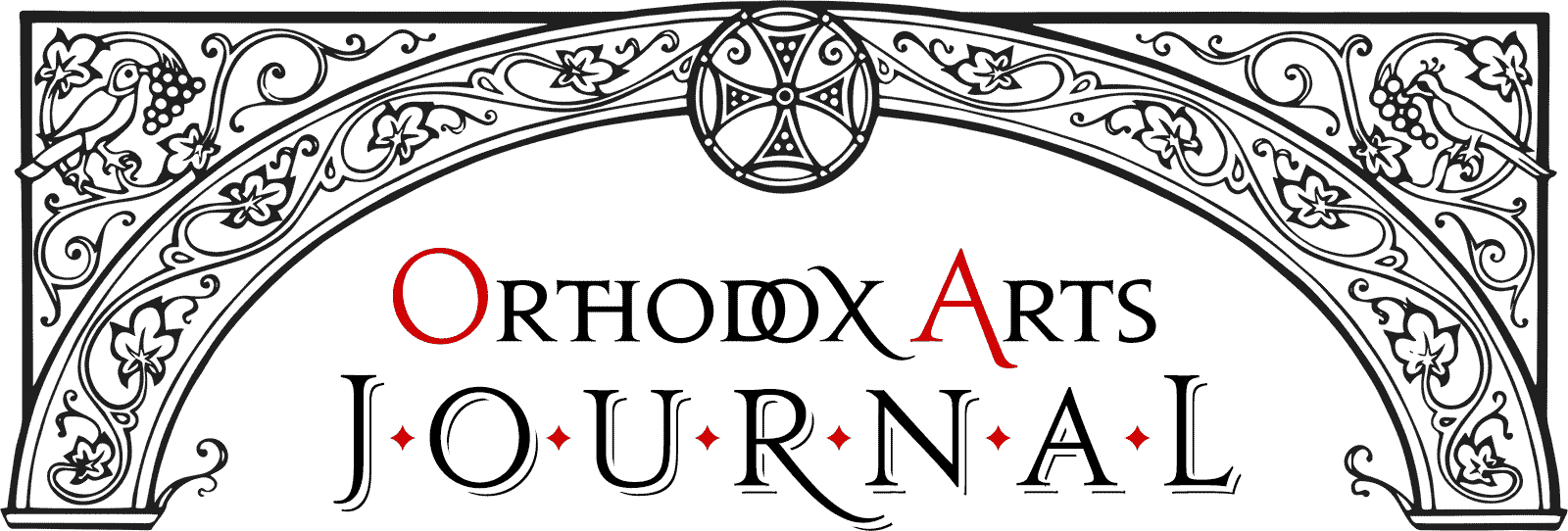
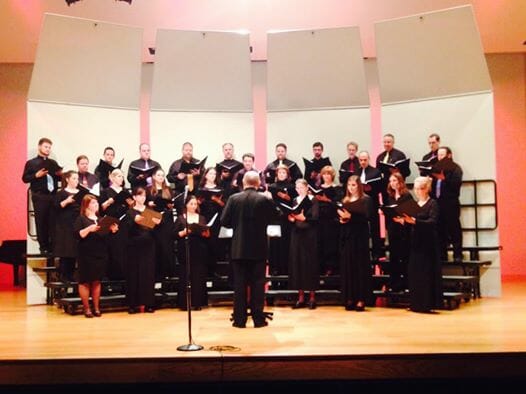
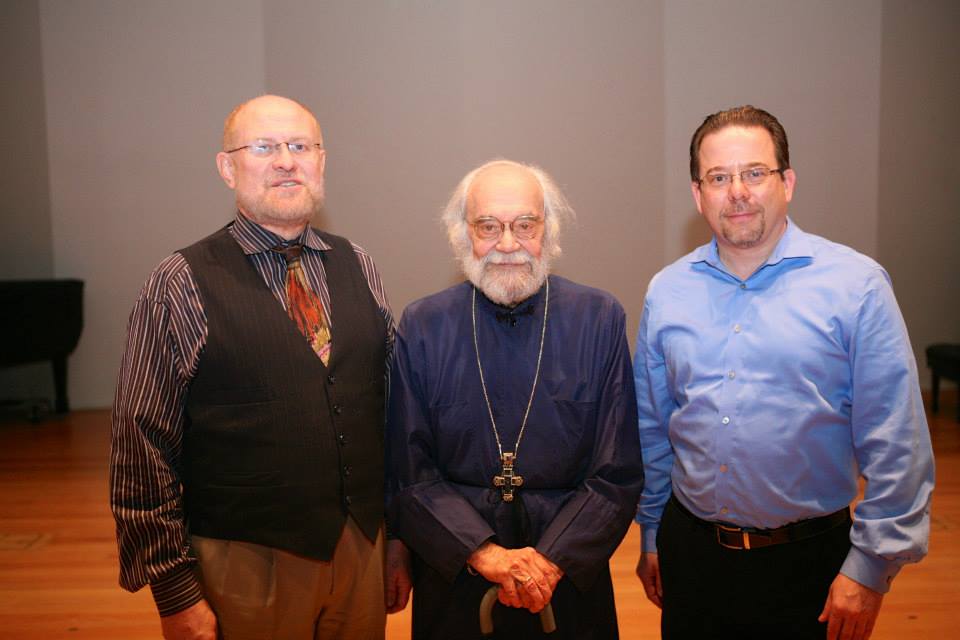
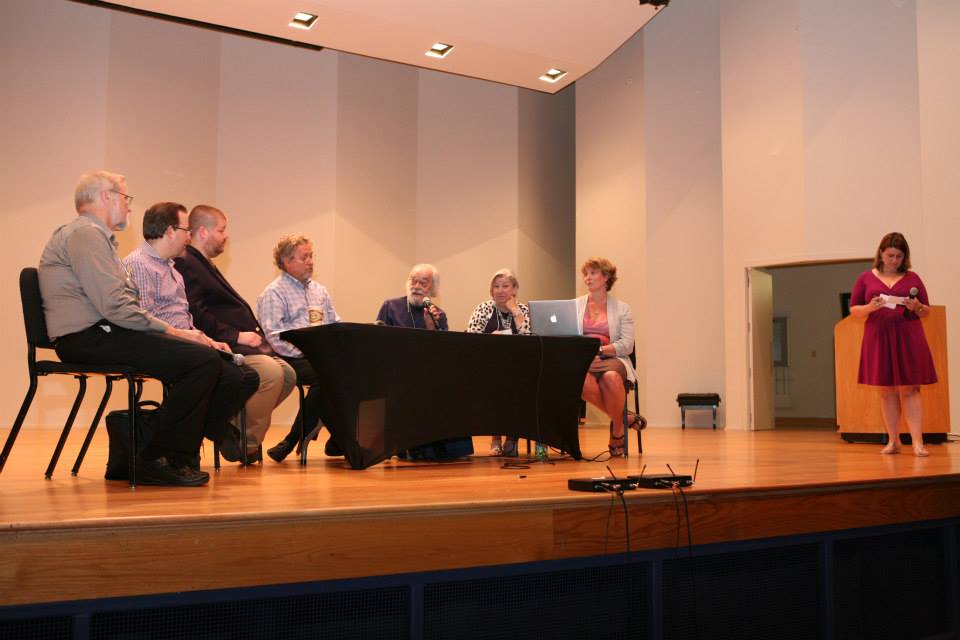
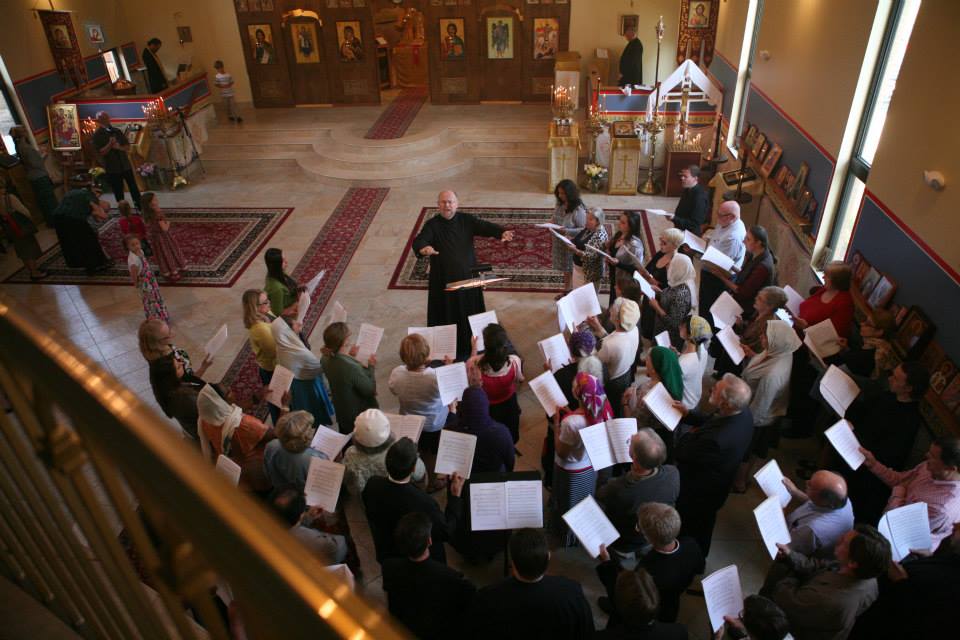
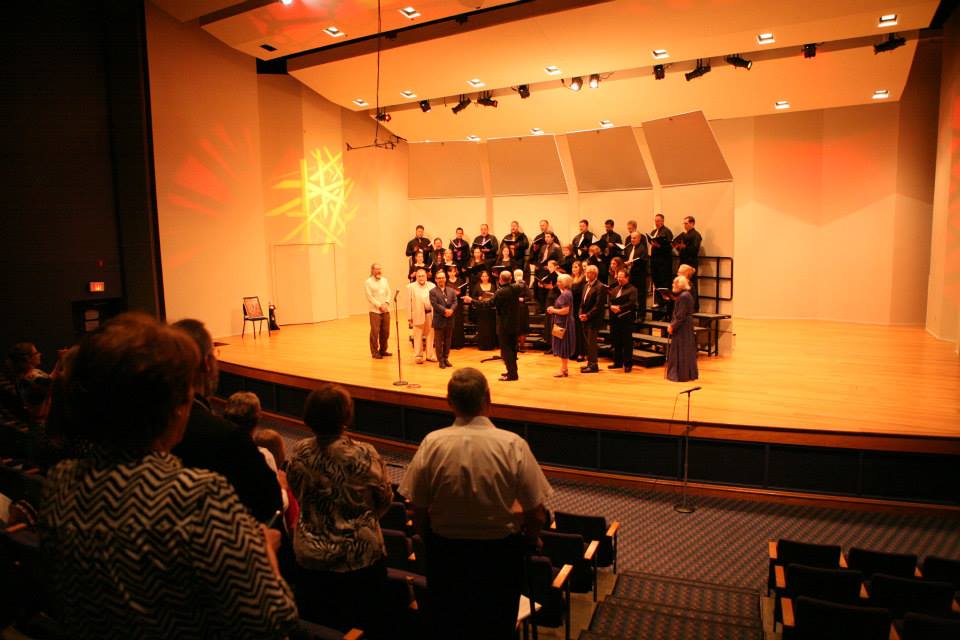
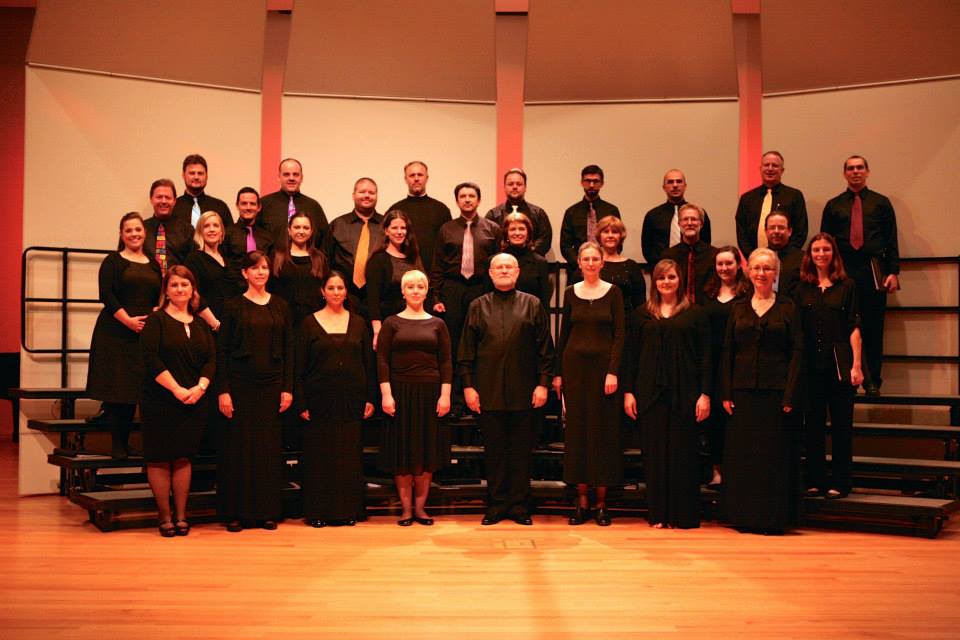
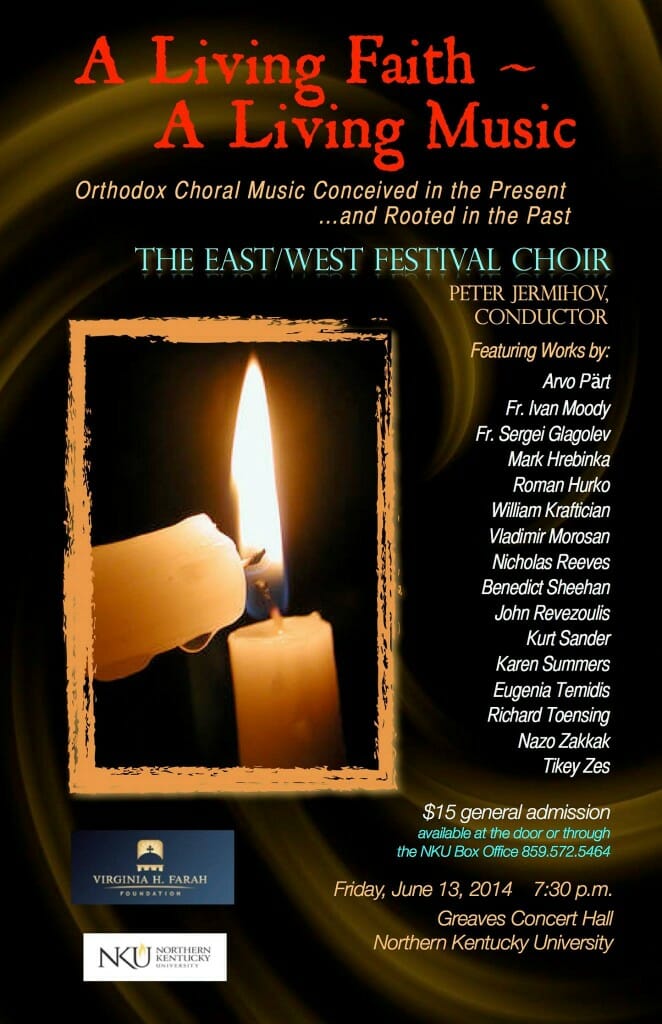
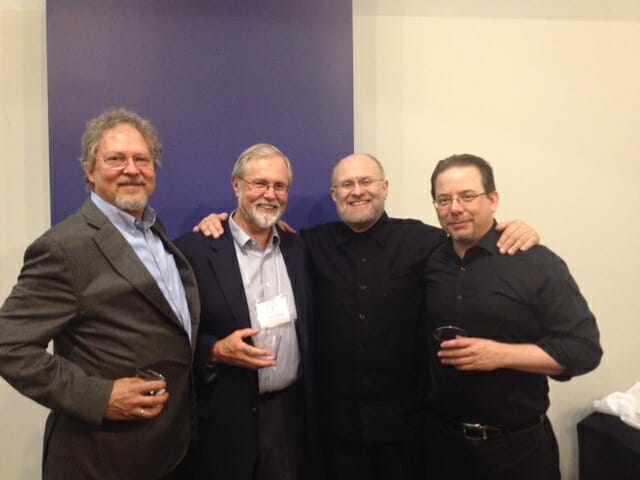
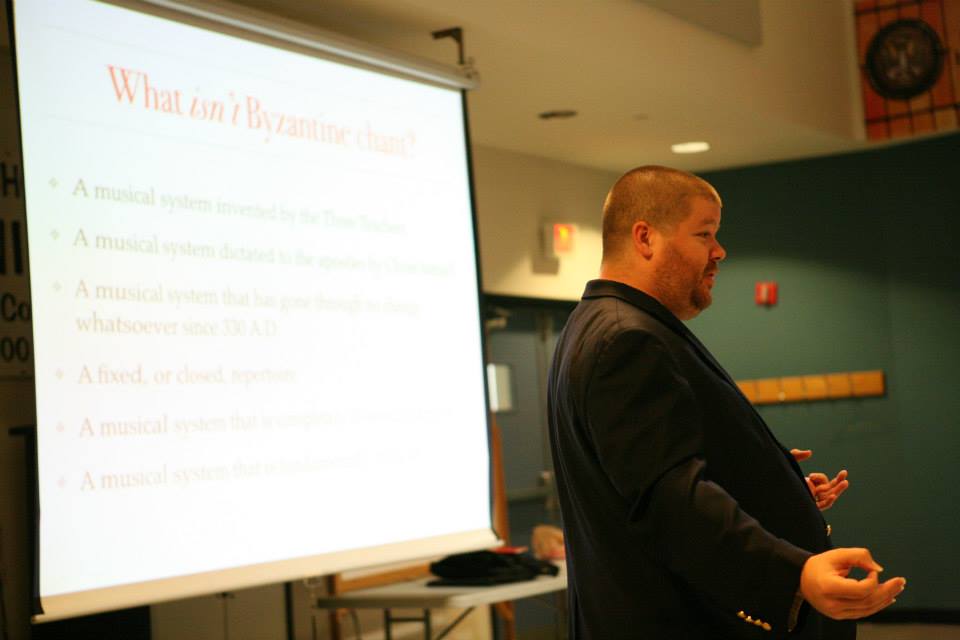
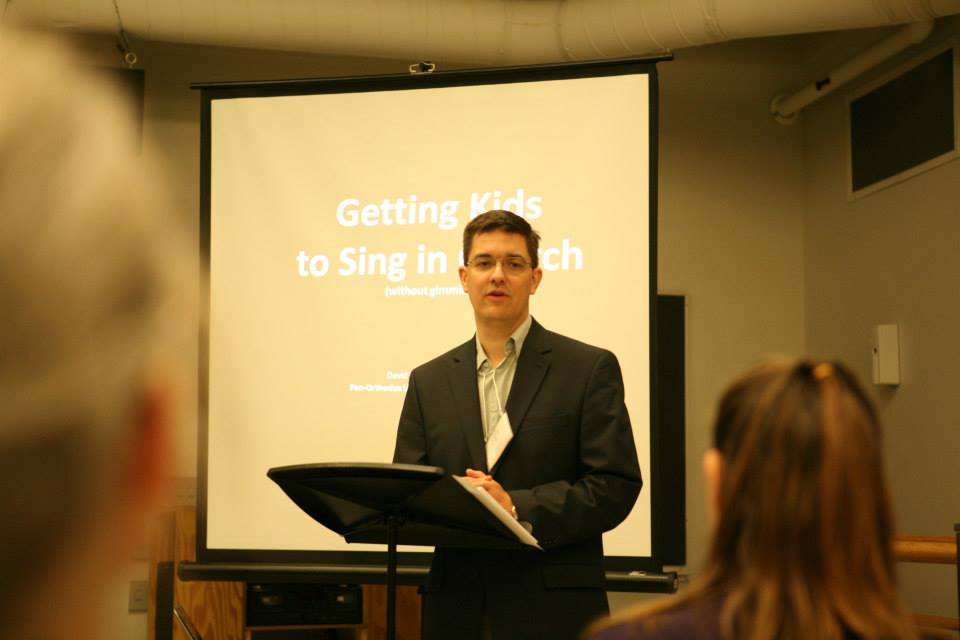
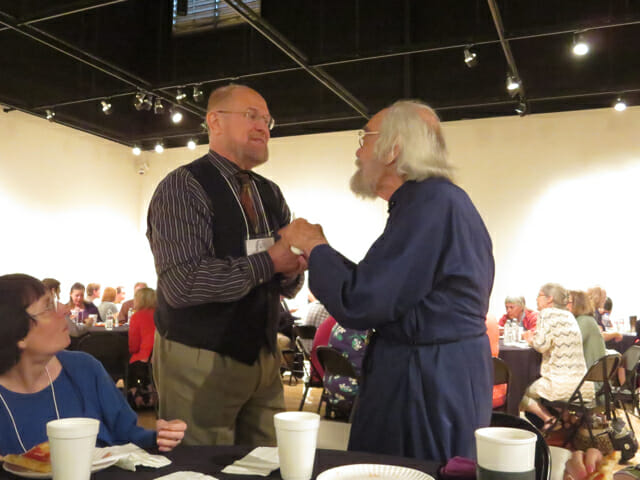
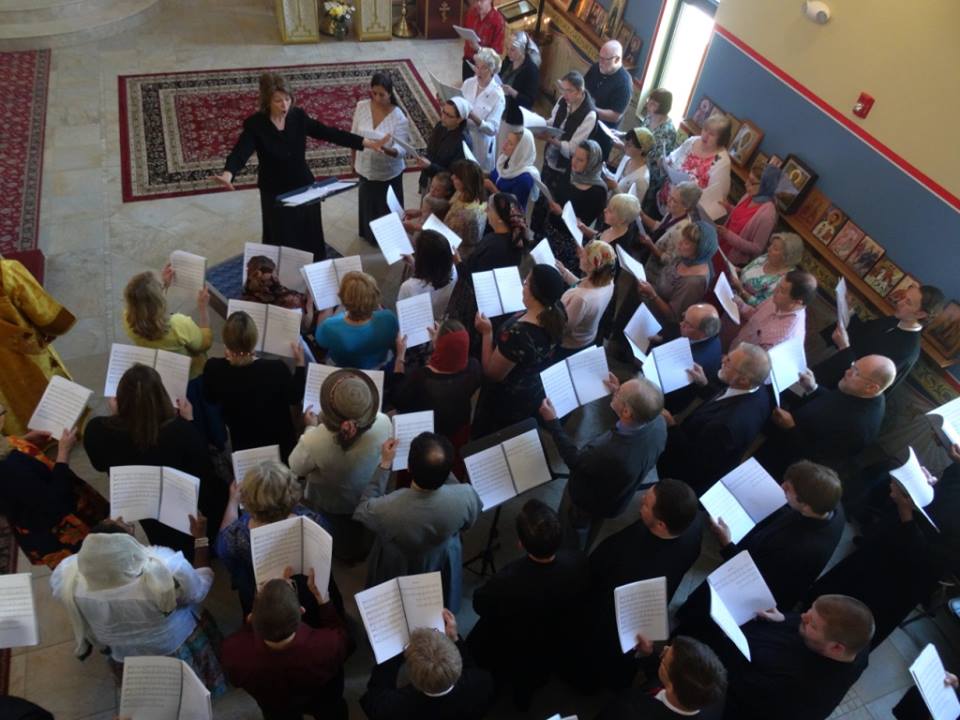
[…] experience; a somewhat abbreviated version of the writeup I was asked to contribute may be found here. My presentation on the Psalm 103 Project is here; the audio of my Byzantine chant talk is […]